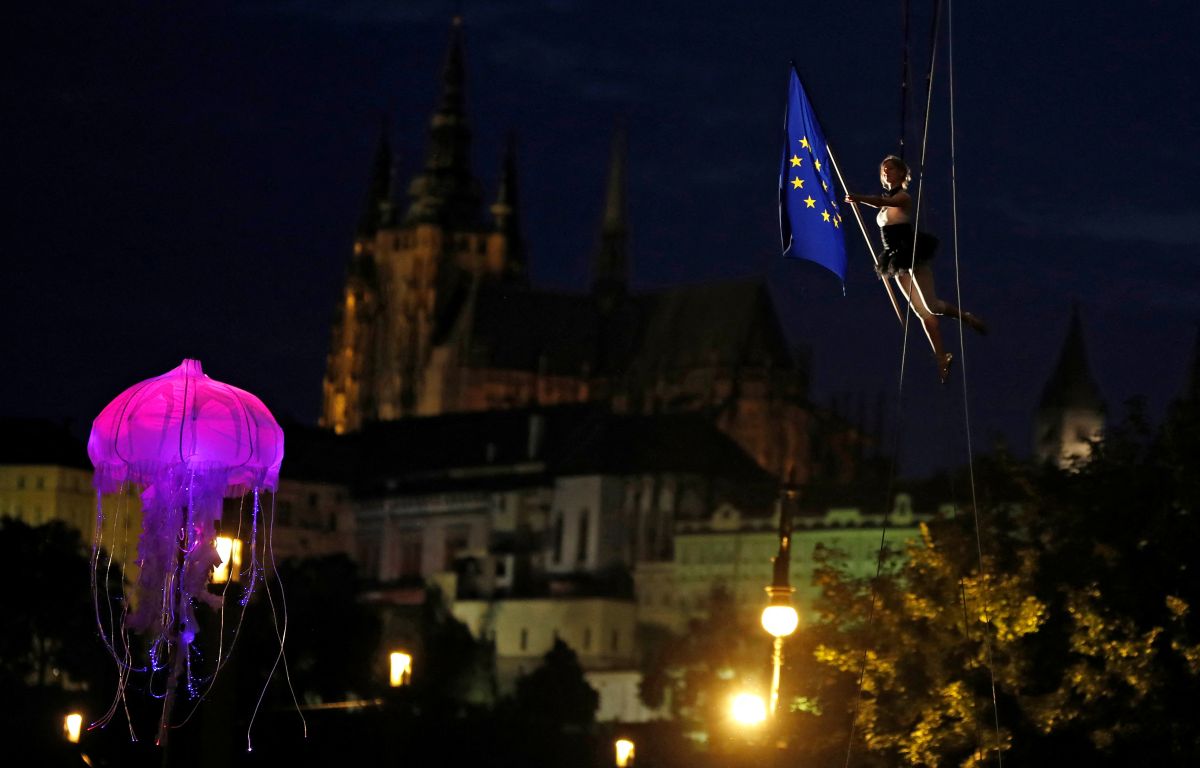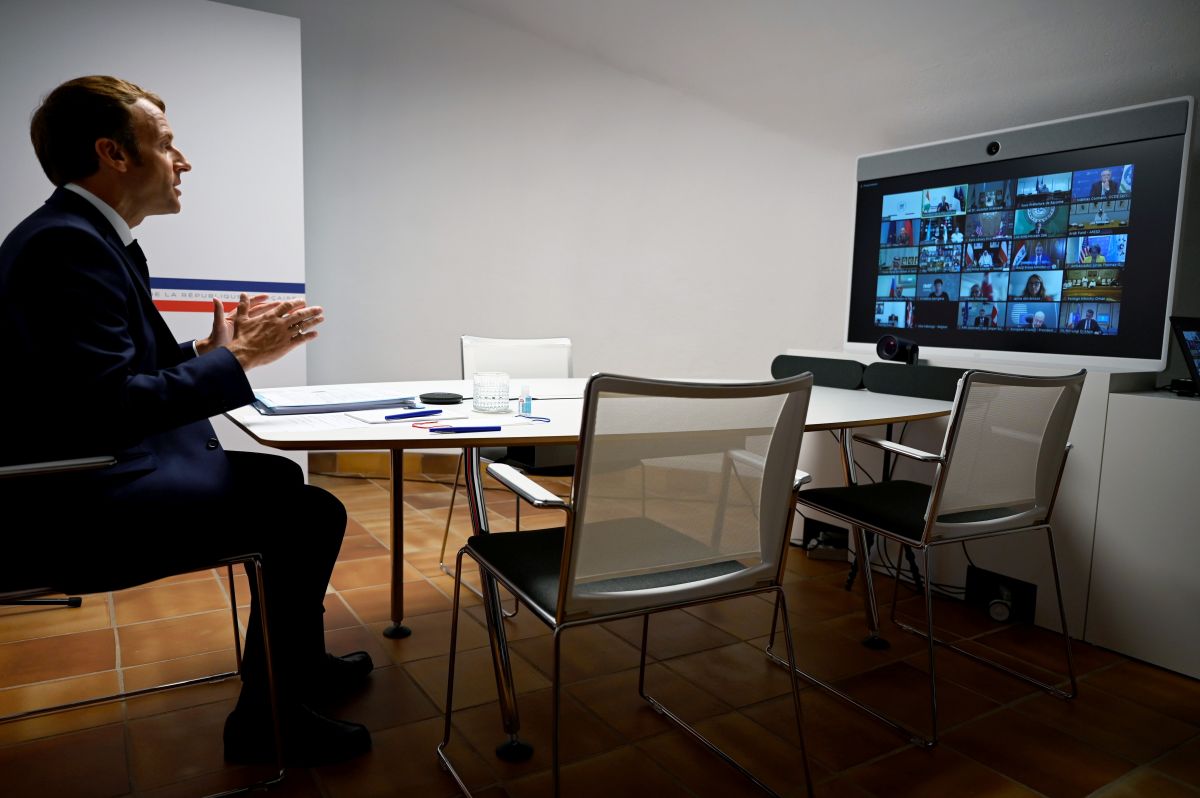"Europe as a Task": the Czech Presidency of the EU Council
The Czech presidency of the EU Council, which began on 1 July, is to be dominated by actions aimed at helping Ukraine, gaining trade and energy independence from Russia, strengthening the security and economic resilience of the Union, and protecting democratic values. These goals are in line with the policy priorities of Prime Minister Petr Fiala’s government, which will likely work earnestly towards their implementation. This is a favourable circumstance for Poland, as these assumptions generally coincide with its objectives, in particular with regard to Ukraine, security, and energy.
 DAVID W CERNY/ Reuters/ FORUM
DAVID W CERNY/ Reuters/ FORUM
The Fiala cabinet will focus on counteracting the effects of both the Russian aggression against Ukraine and the ongoing COVID-19 pandemic, while preparing for the next wave (EU countries, including Czechia, have recorded increases in infections since June). The risks associated with the dynamics of such international events also include the possibility of the United Kingdom breaking the Brexit agreement with the EU. On the other hand, in domestic politics, the campaigns in Czechia ahead of the September local and partial elections to the Senate will affect the rivalries between the parties. Nevertheless, there is little risk of a repeat of the scenario from 2009 when the cabinet of Prime Minister Mirek Topolánek collapsed during the Czech presidency of the EU Council.
Presidency’s Assumptions
The latest Czech presidency promotes support for refugees from Ukraine and the country’s reconstruction. Czechia is among the countries most committed to providing multi-dimensional aid to Ukraine, including military assistance. Fiala has built credibility in this area thanks, among others, to gestures of solidarity, such as the March trip to Kyiv along with the prime ministers of Poland and Slovenia. The foundations of Czech humanitarian aid reflects the country’s experience: between 24 February (the start of the invasion) and the end of June, more than 385,000 Ukrainians found refuge in this country. Fiala has made the degree of EU involvement in the economic reconstruction of Ukraine, in which Czechia sees an opportunity for its enterprises, dependent on the course of the war.
Another important area of the presidency’s activities is strengthening the security of the EU’s external borders, as well as reform of the Schengen area. The government will focus work on a next-generation Schengen Information System and on the Schengen Council, which is to coordinate the responses of the Member States to the situation on the EU’s borders. Consultations on migration issues with partners from outside the EU, including the countries of the Western Balkans, will be conducted through the ministerial summit of the Prague Process, an initiative to discuss migration and asylum, planned for October.
Czechia favours reducing the EU’s and its own energy dependence on Russia. However, the difficulty in implementing this goal was confirmed by the negotiations of the sixth package of EU sanctions adopted in June when, together with Hungary and Slovakia, Czechia was granted significant transition periods to reduce the import of Russian oil. The Czech government announced that it will focus on accelerating the energy transformation via the REPowerEU and Fit-for-55 packages and efforts to ensure that the EU recognises the role of gas and nuclear energy in the transformation. In a speech to the European Parliament (EP) on 6 July, immediately before voting on the official taxonomy, Prime Minister Fiala supported the European Commission (EC) plan concerning the financing of investments in gas and nuclear energy with EU funds.
By taking steps to build economic resilience in the EU, the Czech authorities will try to reverse the negative trends in the domestic economy. Inflation in the country hit 16% year on year in May, the highest since 1993, and the central bank expects a recession by the end of this year. Strengthening of the EU is expected from, among others, the adoption of the European Chips Act and Data Act, with the latter facilitating equal access to data by companies. Czechia considers the modernisation of the EU’s industrial sector to be a key condition for gaining strategic autonomy, which was also one of the priorities of the French presidency in the first half of this year.
On a global scale, in the face of growing problems in EU relations with China and the need to compensate for the loss of business prospects in relations with Russia, the Czech government announced closer trade cooperation between the EU and non-European partners, including Australia, Mexico, and New Zealand, with the EU finishing negotiations with the latter on a trade agreement on 30 June. Enthusiastic about transatlantic cooperation, Fiala’s cabinet also announced the deepening of EU-U.S. relations in the framework of the Trade and Technology Council (TTC). Czechia’s Prague Dialogue on the Indo-Pacific has given it the initiative to also implement EU strategy in this area.
Czechia declares it is an objective moderator in the EU-wide discussion on the rule of law. The government says it is a matter between the Member States and the European Commission. Moreover, the presidency wants to extend the use of democratic mechanisms to the observation of war crimes committed by Russia in Ukraine and to the exchange of experience of the Member States in the field of sanctions. Czechia’s credibility in this area was strengthened by the presentation by the government to the parliament in June of a Magnitsky Act-type law that sanctions Russian officials responsible for human rights violations.
The EU as Seen by the Czech Authorities
The current government, unlike the previous one, does not criticise the EU for internal policy purposes. Moreover, Prime Minister Fiala’s position on the EU forum is more favourable than that of his predecessor, Andrej Babiš, whose alleged fraudulent use of EU funds was investigated by the European Anti-Fraud Office (OLAF) when he was prime minister (he is currently in court proceedings). However, the Fiala government is also cautious about the proposal to strengthen EU integration. This is because of the position of his Civic Democratic Party (ODS) in the five-party coalition, despite the fact that the Czech Pirate Party, focused on deepening EU integration, runs the Ministry of Foreign Affairs. The government also is not planning to introduce the euro, although the zone is expanding next year to include Croatia. The replacement of the crown is supported by 44% of Czech citizens.
Publication of the conclusions of the Conference on the Future of Europe in May has created conditions for the Czech presidency for a debate on reforms in the EU, postulated by the EP, the EC, and some Member States. The Czech government does not see any need for changes to the EU treaties, including the principle of unanimous voting in the Council (suggestions are to change to a majority vote system). Critically assessing the EU’s security architecture, Czechia will strive to implement the Strategic Compass. At the same time, it will try to ensure that EU integration in this field does not take place at the expense of cooperation within NATO.
Czechia favours EU enlargement and is among the states that most strongly supported the decision at the June summit of the European Council to grant Ukraine and Moldova the status of candidate for EU membership. In October, Czechia will organise an informal summit of EU and European third countries with Ukraine in Prague. The Czech government also stresses its support for the accession efforts of the Balkan states. At the same time, it supports the general proposal of French President Emmanuel Macron on political cooperation between the EU and candidate countries.
Conclusions and Perspectives
In addition to continuing negotiations around the EU’s largely developed strategic priorities (such as digitisation of economies and counteracting the climate crisis), the Czech government is facing new, urgent, and complex challenges. In meeting them, it will go beyond the coordinating role, striving to link EU decisions to the national interest as much as possible, which was proven by Fiala’s personal commitment to taxonomy issues.
The Czech presidency will largely be a continuation of the French one because of the aim of further work on reform of the EU, but also because of the similar assessments of some directions of its development, such as migration policy. Czechia took over from France, which together with Sweden created the troika, the reform work on the Common European Asylum System, the Schengen Council, and others. The challenge for it will be to look for an EU-wide compromise after the failure to introduce a minimum tax for corporations, which in June this year was blocked by Hungary.
Joint efforts to support Ukraine may be used by Poland to strengthen cooperation with the Czech presidency and, in six months’ time, also with the upcoming Swedish presidency. An opportunity for this would be the negotiation of the seventh package of sanctions against Russia, which the Polish authorities are seeking. Czechia also will strive to efficiently complete the negotiations on the Fit for 55 package, taking into account the energy security of the Member States. Much will depend on joint gas purchases. Although the Czech presidency lists taking care of democratic values among its priorities, it will be restrained when it comes to disputes between Member States and the EC over the rule of law, limiting itself to supporting dialogue between the parties.




